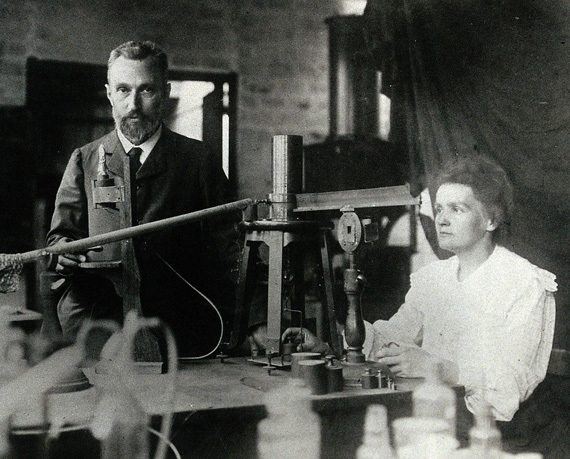You can argue.
Discoveries in science, not business, made by people who are long dead. What could we possibly learn here?
Plenty, in fact.
All scientists have determination, imagination and an ability to pursue great questions. That's obvious. Yet, deep lessons in entrepreneurship hide in their stories.
Here are three of them.
"One never notices what has been done; one can only see what remains to be done."
Let's face it: originality is hard. You find that everywhere. Created something recently? Then you've just committed yourself to a certain path. Before you know it, you think only about what to build next.
Curie was a radiation genius. And a pioneer of field radiography: using X-ray images to extract medical information. When World War I came, she talked rich people into donating their vehicles. Then she gave herself a crash course in auto mechanics, anatomy and X-ray equipment.
By assembling a fleet of X-ray trucks to help treat soldiers, she innovated in a way that saved countless lives. Way ahead of her time.
She could've started a completely new line of research to help treat people. But she didn't. She made creative use of what she already had: cutting-edge physics, coupled with the technology of the previous century.
Yes, Curie was an innovator. As much as any good entrepreneur.
The Lesson
Don't ignore what you already possess. The ideas and insights you need to make a difference could be right under your nose.
Watch out though: a caveat for you. You better make sure what you have is any good to begin with.
"The scientists of today think deeply instead of clearly. One must be sane to think clearly, but one can think deeply and be quite insane."
You know how it is: one idea triggers another. And another. So you write them all down. And you think. And you write some more. Weeks pass. And before you know it, you're drowning in theory. Stacks of paper and sticky notes everywhere.
Worst part? You might be convinced having many untested ideas is always better than having just a few testable ones.
Back in the day, common wisdom said that to transmit electricity you always need wires, or such. In came Tesla--a master balancer of theory and experiment.
The key: he didn't sit down with a stack of paper and derive more equations. The math was good enough. And he saw that. So he built a wireless power transfer device--we now call it the Tesla coil.
Did he then go crazy with it? Maybe. But by refusing to conjure up more untested ideas, he gave us valuable technology still in use. We owe him.
The Lesson
Don't trade clarity for depth. Go too deep and the water gets murky. Anyone can think themselves into exhaustion. The value lies in having the guts to test what you come up with. What idea can you test today?
To do that, you'll have to question assumptions. In fact, to test is to question. Otherwise, if you already know what'll happen, you have zero reason to test.
An entrepreneur's brain is chock-full of assumptions nobody ever tested. Search inside your own, pick the best thing to question, and go test it.
How much should you question? Everything...except the very basics.
"Men should strive to think much and know little."
So much to learn from the ancient Greeks.
Democritus hints at a way to discover far better solutions, without the baggage of common knowledge. Called the 'first principles' approach--high-powered entrepreneurs like Elon Musk swear by it.
Here's how it works. Got a problem? Good. Forget everything known about the problem. Including analogies. Now--what are the things that absolutely have to be true? Figure those out. Then go up from there. All other assumptions are up for debate.
Democritus was an early atomist: he figured everything is made of indivisible bits called atoms. These atoms can 'hook' together and form all the substances we see around us. His first principles.
He didn't stop there. Sitting in his theory is a beta version of one of the keystones of modern physics: energy can't be destroyed.
Was he 100% correct? Of course not. But with his first-principles theory of atoms in hand, he reasoned up and came close to Renaissance-era science. Perhaps two millennia ahead of his time.
Huge gains are possible with this method. When Elon Musk and his team at SpaceX started work on their rocket, they did a first-principles calculation of the costs involved. Here's the thing: they looked at costs of raw materials, not of products on the market.
Their discovery was striking: you can build a rocket for roughly 2% of the usual price. Full price has about 98% fluff. Ergo, lots of room for improvement.
The Lesson
From time to time, start from scratch. You never know what you might come up with.
Three incredible physicists. Each with an important lesson for us as entrepreneurs.
All dead, yes. Yet still inspiring millions.

